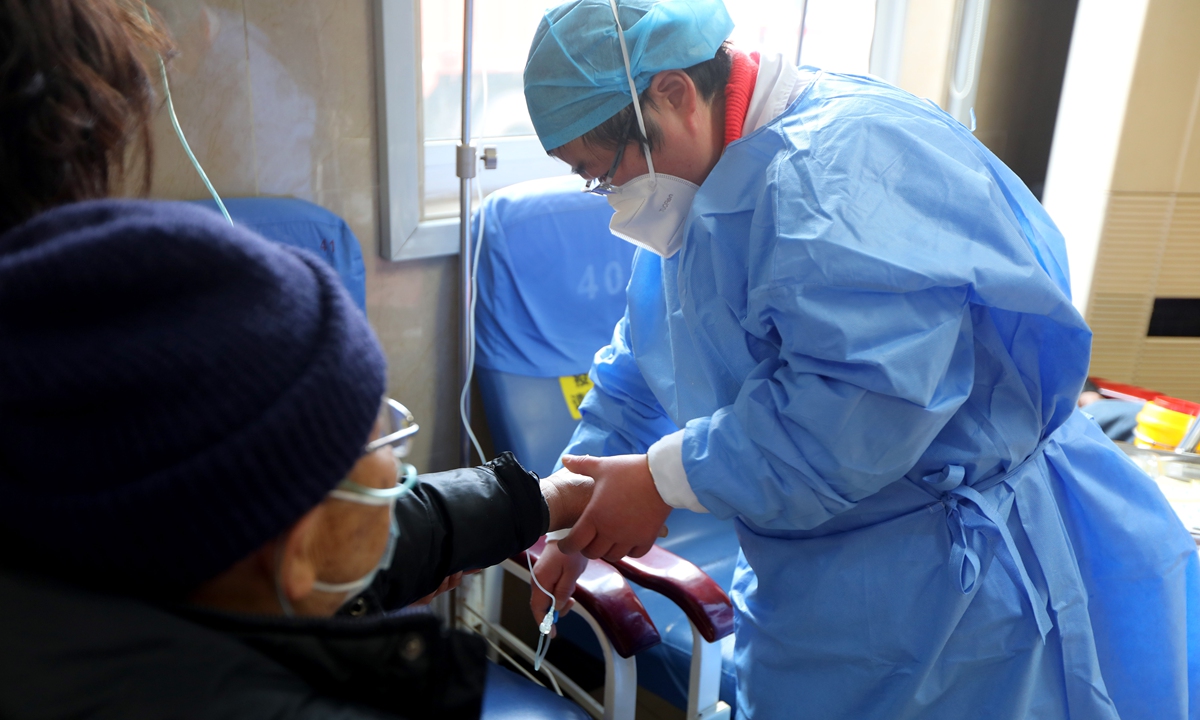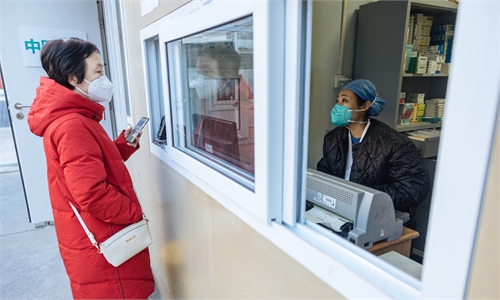
At Taopu Community Health Service Center in Shanghai on Wednesday, a Global Times reporter saw how medical treatment was carried out. Photo: Chen Xia/GT
Shanghai has unveiled a new edition of tiered diagnosis and treatment for COVID-19 to guide medical institutions in classifying treatment of specific cases, listing basic clinical treatment including the use of small-molecule oral antiviral drugs.
Global Times reporters visited two community health centers in Shanghai and saw how grassroots hospitals made efforts to helpl reduce pressure on larger hospitals.
On the basis of the ninth edition of China's COVID-19 control protocols, the new edition of COVID-19 diagnosis and treatment norms and tiered medical services in Shanghai was written by the Shanghai clinical treatment expert group for COVID-19 and the national medical center for infectious diseases, with a simple version for emergency use at the community level.
Shanghai's leading Huashan Hospital affiliated with Fudan University, also one of the Chinese national medical centers for infectious diseases, on Wednesday released the new edition of diagnosis and treatment norms on its WeChat account.
The norms classify COVID-19 patients as mild and ordinary, or severe and critical. For mild or ordinary patients, they should be treated at home or nearby community health centers. For severe patients or those who have serious underlying diseases, they will be transferred to district-level hospitals, according to the norms.
Shanghai has been making efforts to expand the community hospitals' capability in COVID-19 treatment. As of Monday, the city's community health service centers had added 1,711 oxygen inhalation seats, 238 fever consultation rooms, 665 beds and 243 cardiogram monitors, according to the municipal government.
"This week, the number of patients visiting our fever clinics has fallen to about 40 to 50 a day, compared with the peak at the end of December when more than 250 patients visited the fever clinics per day. Some residents have recovered from COVID-19 infections and some have prepared sufficient medicines for relevant symptoms," Su Yi, deputy director of the Taopu Community Health Service Center of Putuo district in Shanghai, told the Global Times on Wednesday.
The newly released norms make it clear that the use of antiviral medicines is one of the main treatments for COVID-19 infections. These drugs are recommended for use in high-risk patients who might develop into severe and critical cases. The best time to use antiviral drugs is at an early stage, preferably within five days after developing symptoms, according to the norms.
The district health authorities provided 100 boxes of the antiviral drug Paxlovid to each community center at the end of December, mainly for the elderly population, Su said. The community center has a strict process to issue the drugs to people in need, such as, the patient must be infected with COVID-19 and the patient's infection period is more than five days. The patient needs to prove the absence of severe liver or kidney disease, according to Su.
Fever clinics have a dispensing list with specific information including date, name of nursing home, drug quantity and contact information, to ensure the drugs are used by people in need.
The community health centers have played a vital role in reducing pressure caused by crowding at large hospitals, such as treating patients transferred from the large hospitals. Su said about 80 percent of his colleagues had been infected with COVID-19 and "we have overcome the most difficult time."
"My husband got a fever last night. I accompanied him to get some drugs. Today there are fewer people lining up," a local Shanghai resident in her 60s waiting at the fever clinic told the Global Times on Wednesday.
In another hospital -- Pujiang Community Health Service Center, which covers nearly 280,000 residents -- visits also declined this week.
Family doctors will assess patients' conditions, such as when they tested positive and whether they are aged above 65 with underlying diseases. They can obtain the medicine on a priority basis with a prescription at the community health service center, Gao Jing, deputy director of the center told the Global Times on Wednesday.
The center has applied to buy two non-invasive ventilators for the treatment of patients with mild symptoms or in stable condition.
There are 506 medical personnel and other hospital staffers in the Pujiang health center. At present, 90 percent of those infected with COVID-19 have already returned to their positions after recovery.

